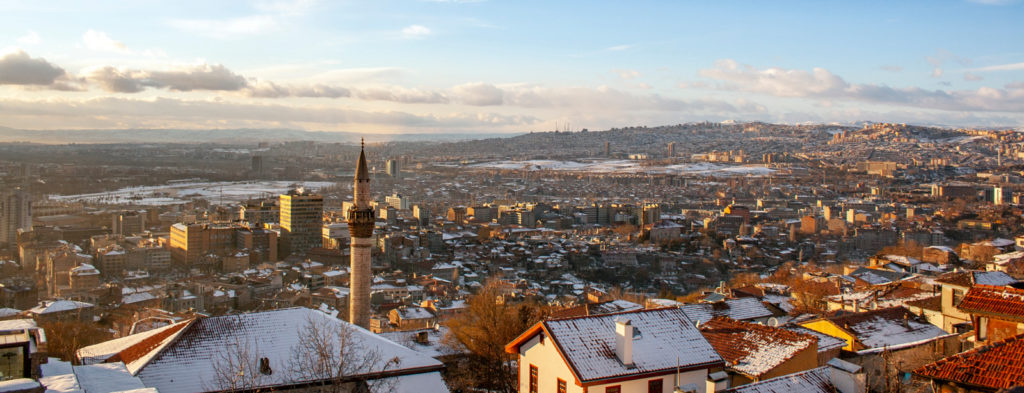Missionary Refugees: Southeastern Trains Farsi-speaking Christians for Diaspora Missions
Chad Burchett | October 27, 2022

Over the summer, Southeastern Baptist Theological Seminary facilitated six seminars in Turkey and Germany for Farsi-speaking students in its Persian Leadership Development (PLD) program.
Although the modern refugee crisis in Europe and Central Asia is owing to a confluence of wars, religious oppression, and political instability, the suffering of millions of refugees has not stymied God’s plan of redemption or the gospel testimony of the Church.
A vibrant witness to God’s providence in suffering, many Farsi-speaking Christians have assumed the role of international missionaries as they have fled or been displaced from their homes. Facing daily persecution in the Middle East or suffering hardships as refugees throughout Europe, many Farsi-speaking Christians are breathing new life into European churches and mobilizing Muslim-background believers for Great Commission ministry.
As one of the fastest growing Christian populations in the world, Farsi-speaking Christians are uniquely positioned to lead a burgeoning missionary movement in Europe and the Middle East. Indeed, many Farsi-speaking Christians are already involved in revitalizing efforts across Europe.
Gathering PLD cohorts in Turkey and Germany, Southeastern administrators and professors had the opportunity to encourage and equip more than one hundred Farsi-speaking students over the summer during six intensive seminars. These seminars provided students with a unique opportunity for in-person biblical and theological training — an opportunity that would be otherwise unavailable in their home countries.
“We had a wonderful opportunity to see our students face to face, encourage them, and be blessed by them,” shared Kambiz Saghaey, Director for Persian Leadership Development. “We may be teaching them biblically and theologically, but we are also learning from them — how they are living in persecution and suffering as refugees under various pressures. They are always eager to hear and study the word of God and are fresh and zealous to learn and serve wherever they are.”
We may be teaching them biblically and theologically, but we are also learning from them — how they are living in persecution and suffering as refugees under various pressures.
Modeling a passion for evangelism and missions, the students demonstrated their heart to serve God wherever he placed them — even during the busyness of their seminars. Gathering in local hotels for the seminars, PLD students intentionally shared the gospel with hotel staff and were able to practice their training in the context of everyday evangelism encounters.
Several of the summer seminars covered select books of the Bible and highlighted theological themes uniquely relevant to the students’ lives, ministry, and experiences of suffering. Studying the book of Job and God’s presence in suffering, many of the students were able to process questions about suffering arising from their lived experience and were encouraged to endure by faith in God’s promises throughout Scripture.
Additional seminars focused on other biblical books such as Ezra, Nehemiah, Esther, and Song of Songs, equipping students to study, interpret, teach, and embody the truths of God’s word amid daily persecution and suffering. Many students also attended a seminar entitled “Mentoring in the Church” — a course designed to equip students to lead and disciple recent converts and seasoned believers toward greater faithfulness to God and his Great Commission.
With a heart for theological education, these Farsi-speaking, Muslim-background believers represent current and future generations of Persian ministry leaders who desire to see the nations and their home countries reached with the gospel. Through the training they receive in Southeastern’s PLD program, these students are being equipped to lead grassroots mission movements in refugee camps and cities throughout Europe and in house churches and underground communities in their home countries.
“Our students in the PLD program are already ministering around the world, serving as missionaries in their countries or as missionary refugees in other countries,” commented Kambiz. “Through the program, we come alongside these brothers and sisters as they are ministering, and we train them for the ministry they are doing.”
“At Southeastern we equip students to graduate and go as missionaries to fulfill the Great Commission all around the world,” noted Kambiz. “However, through our PLD program, we are not just training students to be missionaries. They are already missionaries in a variety of cultures, revitalizing the gospel influence of churches throughout Europe, Turkey, and the Middle East.”
Through our PLD program, we are not just training students to be missionaries. They are already missionaries in a variety of cultures, revitalizing the gospel influence of churches throughout Europe, Turkey, and the Middle East.
As a strategic part of Southeastern’s Global Theological Initiatives office, the PLD program currently offers more than 3,000 Farsi-speaking students the first-ever accredited theological bachelor’s degree and master’s degree in Farsi. To learn more about this program and Southeastern’s other people initiatives or to find out how you can support these efforts, visit sebts.edu/gti.
To read more about missions in the Middle East and in a variety of other contexts, check out the book, “14 Journeys: Engaging an Increasingly Pluralistic World with Christian Civility and Charity” by George Braswell. Distinguished Professor Emeritus of Missions and World Religions at Southeastern, Braswell served as the International Mission Board’s first missionary to Iran from 1969-1974. In “14 Journeys,” Braswell shares his personal insights and experiences from the mission field and from the classroom to encourage the next generation of missional students and leaders. All proceeds from the book directly support the PLD program, equipping Farsi-speaking students to live on mission in some of the world’s hardest-to-reach countries.